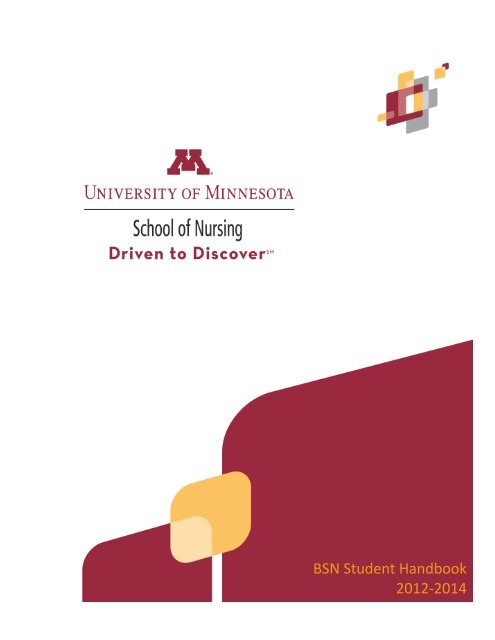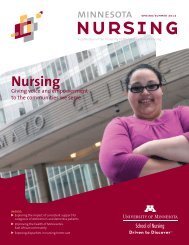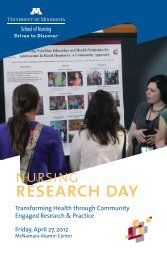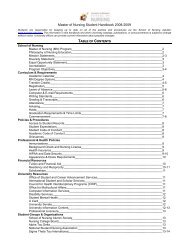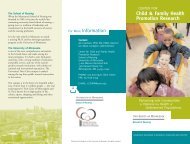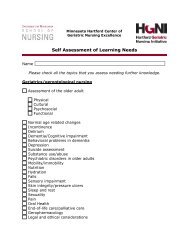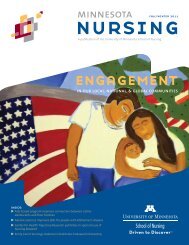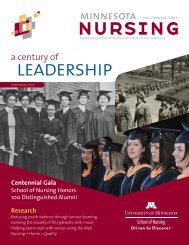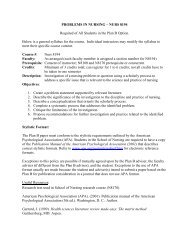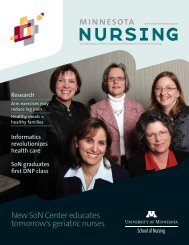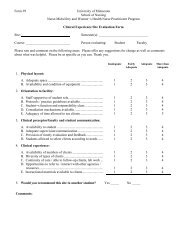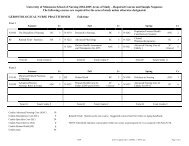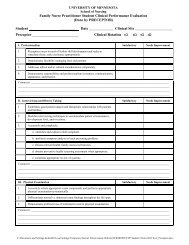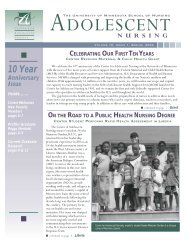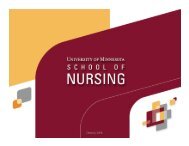BSN Student Handbook - School of Nursing - University of Minnesota
BSN Student Handbook - School of Nursing - University of Minnesota
BSN Student Handbook - School of Nursing - University of Minnesota
Create successful ePaper yourself
Turn your PDF publications into a flip-book with our unique Google optimized e-Paper software.
<strong>BSN</strong> <strong>Student</strong> <strong>Handbook</strong><br />
2012-2014
<strong>University</strong> <strong>of</strong> <strong>Minnesota</strong> <strong>School</strong> <strong>of</strong> <strong>Nursing</strong><br />
2012-2014 <strong>BSN</strong> <strong>Student</strong> <strong>Handbook</strong><br />
<strong>School</strong> <strong>of</strong> <strong>Nursing</strong> Contact Information<br />
<strong>School</strong> <strong>of</strong> <strong>Nursing</strong><br />
<strong>University</strong> <strong>of</strong> <strong>Minnesota</strong><br />
5-140 Weaver-Densford Hall<br />
308 Harvard Street SE<br />
Minneapolis, MN 55455<br />
Phone: 612-624-9600 (Twin Cities)<br />
1-800-598-8636 (toll free)<br />
Fax: 612-626-2359<br />
E- mail: sonstudentinfo@umn.edu<br />
Web : www.nursing.umn.edu<br />
TABLE OF CONTENTS<br />
Advising and <strong>Student</strong> Services<br />
Advising 4-5<br />
Advising Appointments 4<br />
Office <strong>of</strong> <strong>Student</strong> and Career Advancement Services (OSCAS) 5<br />
<strong>BSN</strong> Program Information<br />
Program Objectives for the <strong>BSN</strong> Program 5-6<br />
Curriculum and Requirements 6<br />
Expenses Related to <strong>Nursing</strong> Education 6-7<br />
Requirements for Entering and Continuing in the <strong>BSN</strong> Program<br />
CPR Requirements 7<br />
Health Requirements 7<br />
Background Study 7-8<br />
Bloodborne Pathogen Exposure Training 8<br />
HIPAA and Data Security 8<br />
Appearance and Dress (specific guidelines) 9-10<br />
Adaptation <strong>of</strong> Uniform 10<br />
<strong>School</strong> <strong>of</strong> <strong>Nursing</strong> Computer Requirements 10<br />
Academic Standards 11-12<br />
Behavioral Standards 12-14<br />
Technical Standards Performance Requirements and<br />
Disability Accommodations<br />
Technical Standards 15-17<br />
Services for <strong>Student</strong>s with Disabilities 17<br />
2
<strong>Student</strong> Information<br />
<strong>University</strong> E-Mail Account 17<br />
Adult Progress Audit System (APAS) 18<br />
Dean’s List 18<br />
Petitions 18<br />
Graduation Requirements 18<br />
Graduation with Distinction 18<br />
Honors 19<br />
Pr<strong>of</strong>essional Licensure 19<br />
Policies and Procedures<br />
Attendance/Absences 19-20<br />
Change <strong>of</strong> Registration 20<br />
Voluntary Withdrawal (from Classes) 20<br />
One-Time Drop 20-21<br />
Leave <strong>of</strong> Absences 21<br />
Re-entry into the <strong>BSN</strong> Program 21<br />
Grading 21<br />
<strong>University</strong> <strong>of</strong> <strong>Minnesota</strong> Grading and Transcript Policy 21-22<br />
Incomplete Grades 22<br />
Notice <strong>of</strong> Concern 22<br />
Satisfactory/Unsatisfactory Progress 23<br />
Academic Probation 23<br />
Terms <strong>of</strong> Dismissal 23-24<br />
Conflict Resolution 24<br />
<strong>Student</strong> Misconduct (Filing a Report) 24<br />
<strong>Student</strong> Misconduct Hearing Procedures 24-27<br />
Access to <strong>Student</strong> Educational Records 28<br />
Equal Opportunity 28<br />
<strong>Student</strong> Resources<br />
Boynton Health Service 28-29<br />
Housing & Residential Life 29<br />
Disability Services 29<br />
<strong>University</strong> Counseling and Consulting Services 29-30<br />
<strong>Student</strong> Groups and Organizations<br />
<strong>Student</strong> Union & Activities 30<br />
<strong>Nursing</strong> College Board 30<br />
Global Health & Transcultrual <strong>Nursing</strong> 30<br />
National <strong>Student</strong> <strong>Nursing</strong> Association 31<br />
Sigma Theta Tau International 31<br />
<strong>School</strong> <strong>of</strong> <strong>Nursing</strong> Alumni Society 31<br />
Council for Health Interdisciplinary Participation (CHIP) 32<br />
3
Advising and <strong>Student</strong> Services<br />
Advising<br />
<strong>Nursing</strong> students are assigned a pr<strong>of</strong>essional academic advisor located in the Office <strong>of</strong> <strong>Student</strong><br />
and Career Advancement Services in 5-160 Weaver-Densford Hall upon entry into the <strong>School</strong> <strong>of</strong><br />
<strong>Nursing</strong>.<br />
Academic Advising is an educational process that, by intention and design, facilitates students’<br />
understanding <strong>of</strong> the meaning and purpose <strong>of</strong> higher education and fosters their intellectual and<br />
personal development toward academic success and lifelong learning (National Academic<br />
Advising Association, 2004).<br />
Although you are responsible for your progress in school and staying up to date on your degree<br />
progress, your academic advisor is here to help you with questions or issues that arise along the<br />
way. The Academic Advisor for the <strong>BSN</strong> program is Sarah Ihrig. Sarah can assist you with day to<br />
day advising issues, such as planning liberal education classes, declaring a minor, submitting a<br />
petition, dropping courses, graduation planning, as well as issues related to academic difficulty,<br />
adjusting to college life, exploring your campus resources. Things to discuss with your<br />
academic advisor include:<br />
• Transfer credit evaluations<br />
• Petitions<br />
• Leave <strong>of</strong> Absence<br />
• Academic probation and suspension<br />
• Registration hold releases<br />
• Graduation and commencement<br />
• Concerns/grievances related to SON or<br />
• <strong>University</strong> policies<br />
• Issues with clinicals or nursing courses<br />
• Questions about the nursing pr<strong>of</strong>ession<br />
• Academic difficulties<br />
• Liberal Education coursework<br />
• Dropping a class<br />
• Study abroad planning<br />
To make an appointment contact Sarah directly at 612.624.1906 or sihrig@umn.edu.<br />
Advising Appointments<br />
You are welcome to meet with your advisor at any time during the academic year. You must<br />
take the initiative to arrange the first and each subsequent meeting with your academic<br />
advisor. It is advisable that you touch base with your advisor at least once or twice a year to be<br />
sure you are on track with your academic programs.<br />
4
Office <strong>of</strong> <strong>Student</strong> and Career Advancement Services<br />
The OSCAS staff is here to help you in a variety <strong>of</strong> ways as you move through your<br />
undergraduate degree program. Some areas we can assist with are:<br />
• Academic advising and planning<br />
• Scholarship questions<br />
• Materials and information about <strong>School</strong> <strong>of</strong> <strong>Nursing</strong> academic programs<br />
Contact Information<br />
5-140 Weaver-Densford Hall<br />
308 Harvard Street S.E.<br />
Minneapolis, MN 55455<br />
Phone: 612-625-7980<br />
Fax: 612-625-7727<br />
Email: sonstudentinfo@umn.edu<br />
<strong>BSN</strong> Program Information<br />
The baccalaureate program prepares outstanding graduates who are skilled in delivering<br />
nursing care, able to contribute to the evolving science <strong>of</strong> nursing, and capable <strong>of</strong> moving into<br />
leadership positions where they can positively influence health care for individuals and groups.<br />
Graduates are ready for entry into nursing practice and for graduate study. They are prepared<br />
to provide nursing care to clients in a variety <strong>of</strong> settings, to use a scholarly approach to<br />
acquiring knowledge, to be life-long learners, and to be leaders in nursing. Graduates are<br />
confident <strong>of</strong> their contributions to the care <strong>of</strong> clients, identify with nursing as a pr<strong>of</strong>ession, and<br />
are able to articulate the nurse's role to other disciplines in health care and to the public.<br />
<strong>BSN</strong> Program Objectives<br />
At the completion <strong>of</strong> the program, the students will:<br />
• Exemplify generative leadership and commitment to the provision <strong>of</strong> high quality, safe,<br />
ethical, evidence-based practice that is holistic, culturally sensitive and person-centered.<br />
• Value scholarship and engage in the creation <strong>of</strong> scholarly products by collaborating<br />
effectively within nursing and interpr<strong>of</strong>essional teams.<br />
• Transform personal and pr<strong>of</strong>essional reflections, knowledge, skills, and attitudes into<br />
purposeful action to improve health.<br />
• Integrate knowledge <strong>of</strong> emerging technologies and healthcare systems with data and<br />
information in order to inform decision making in pr<strong>of</strong>essional nursing practice.<br />
• Epitomize values <strong>of</strong> the nursing pr<strong>of</strong>ession that include life-long learning and global<br />
citizenship.<br />
5
The <strong>BSN</strong> program is for high-ability, achievement-oriented students and provides a challenging<br />
learning environment with innovative approaches to faculty-student relationships and scholarly<br />
learning experiences. <strong>Nursing</strong> courses include lectures, on-line activities, seminars,<br />
laboratories, and clinical practice. <strong>Student</strong>s learn client care in a variety <strong>of</strong> settings that may<br />
include hospitals, clinics, homes, long-term care facilities, and other health care settings.<br />
<strong>Student</strong>s provide care to clients with diverse health care problems in real-life situations.<br />
Curriculum and Requirements<br />
<strong>BSN</strong> Curriculum<br />
The <strong>School</strong> <strong>of</strong> <strong>Nursing</strong> educates students in theoretically based nursing care with emphases on<br />
clinical competence, leadership skills, and critical evaluation. The program prepares students to<br />
be skilled clinicians who think critically and analytically as they encounter patient needs and<br />
health care issues. The school's membership in the <strong>University</strong> <strong>of</strong> <strong>Minnesota</strong> Academic Health<br />
Center allows opportunities for interpr<strong>of</strong>essional research and study.<br />
The program is a sequence <strong>of</strong> nursing courses spanning six semesters. Coursework covers<br />
concepts <strong>of</strong> nursing, health, family, ethics, leadership, informatics, teaching, learning,<br />
transcultural care, global health, and research. <strong>Student</strong>s develop skills during experiential<br />
learning activities that include laboratory practice and simulation, and they apply knowledge<br />
and skill from coursework to patient, family, and population-based care in clinical settings.<br />
Coursework covers physical assessment, interpersonal communication, pr<strong>of</strong>essional and<br />
leadership issues, research methods, and health care delivery systems. The school has contracts<br />
with a variety <strong>of</strong> agencies for use <strong>of</strong> their facilities for student clinical experiences in settings<br />
such as acute care hospitals, public health agencies, residence and long-term care facilities,<br />
clinics, child care centers, and schools. All students must complete a clinical immersion in the<br />
senior year. These clinical experiences are planned and supervised by faculty members.<br />
To complete the <strong>BSN</strong> degree, students must complete at least 120 total semester credits. All<br />
<strong>University</strong> <strong>of</strong> <strong>Minnesota</strong> Liberal Education Requirements must be satisfied.<br />
<strong>BSN</strong> Curriculum Guides can be found at www.nursing.umn.edu or in the Office <strong>of</strong> <strong>Student</strong> and<br />
Career Advancement Services.<br />
Expenses Related to <strong>Nursing</strong> Education<br />
Current undergraduate tuition rates and fees can be found at http://onestop.umn.edu.<br />
In addition to books and general supplies, other essential items are uniforms, a photo ID badge,<br />
a watch with a second hand, and a stethoscope must also be considered in educational costs.<br />
Purchase <strong>of</strong> additional equipment may be recommended as clinical experiences and<br />
placements warrant.<br />
6
With an ever-increasing number <strong>of</strong> clinical assignments at <strong>of</strong>f-campus locations, students<br />
should include reliable transportation costs in their educational planning, as students are<br />
responsible for providing their own transportation to and from clinical sites.<br />
Hospitalization insurance is mandatory for students carrying more than 6 credits. For students<br />
who do not have a Boynton-approved private carrier, student insurance is required.<br />
Long-term disability insurance is also mandatory for all Academic Health Center students. If, for<br />
example, a student develops a condition preventing the student from continuing their<br />
education, long term disability insurance will <strong>of</strong>fset the future income lost due to the student’s<br />
inability to practice in their chosen field.<br />
Requirements for Entering and Continuing in the <strong>BSN</strong> Program<br />
CPR Requirements<br />
<strong>Student</strong>s who have been admitted to the <strong>School</strong> <strong>of</strong> <strong>Nursing</strong> are required to have current<br />
certification in cardiopulmonary resuscitation (CPR) at the health pr<strong>of</strong>essional level. These<br />
documents must be on file with the Office <strong>of</strong> <strong>Student</strong> Services and updated annually. <strong>Student</strong>s<br />
whose CPR documentation has expired may not progress academically or care for patients at<br />
clinical sites until the documentation is current.<br />
Health Requirements<br />
<strong>Student</strong>s who have been admitted to the <strong>School</strong> <strong>of</strong> <strong>Nursing</strong> are required to provide evidence<br />
that they are up to date with Academic Health Center required vaccinations. Please see the<br />
Boynton Health Service website for up to date information on immunization requirements:<br />
http://www.bhs.umn.edu/immunization-requirements.htm<br />
All vaccination records will be maintained by Boynton <strong>Student</strong> Health Services. <strong>Student</strong>s are<br />
advised to keep copies <strong>of</strong> all records pertaining to health care certifications and vaccination<br />
status for their personal/employment needs.<br />
Background Study<br />
<strong>Minnesota</strong> state law requires a background check on any person who directly works with<br />
patients or residents in health care facilities. The state allows educational programs to initiate<br />
the background studies on their students as an alternative to each licensed facility requesting<br />
the studies. Results <strong>of</strong> background checks initiated by an educational program may be released<br />
to the clinical sites where students are placed. <strong>Student</strong>s sign a Release <strong>of</strong> Information form that<br />
allows the <strong>School</strong> <strong>of</strong> <strong>Nursing</strong> to share results with other facilities. The Background Study results<br />
are valid for one year only; therefore, you must update this each year.<br />
(Note: If the results <strong>of</strong> the Background Study disqualify you from having direct patient contact<br />
and if the disqualification is not set aside by the Commissioner <strong>of</strong> Health, you may not be<br />
accepted for clinical placement at licensed facilities. Consequently, you might not be eligible for<br />
a degree in our program. If you are disqualified but have requested reconsideration from the<br />
Commissioner <strong>of</strong> Health, in most circumstances clinical sites may allow you to continue direct<br />
7
patient contact at their facility, pending the outcome <strong>of</strong> the reconsideration. You must,<br />
however, provide documentation that you have requested the reconsideration.)<br />
<strong>Minnesota</strong> Department <strong>of</strong> Human Services<br />
Division <strong>of</strong> Licensing<br />
Background Study Unit<br />
444 Lafayette Road<br />
St. Paul, MN 55155-3842<br />
Notice for U <strong>of</strong> MN-Rochester students only: In addition to the required state background<br />
check, the Mayo Clinic requires that all students participating in clinical rotations in their<br />
facilities to complete an additional federal background check. There is a $55 fee associated with<br />
this background check that you will be responsible for. This is a one-time check that is<br />
completed during students’ first year in the <strong>BSN</strong> program.<br />
Bloodborne Pathogen Exposure Training<br />
The Academic Health Center provides a training course regarding protecting yourself in the<br />
event <strong>of</strong> a bloodborne pathogen exposure. Completion <strong>of</strong> this training is a requirement for all<br />
AHC students in clinical settings. <strong>Student</strong>s can Login and complete this one-time training at<br />
https://eresearch.umn.edu/bbp/trainee. Both the introductory and advanced modules are<br />
required.<br />
Upon entering the <strong>BSN</strong> program students will also receive a laminated card to keep with their<br />
clinical name badge that outlines the specific steps to follow if you experience an exposure<br />
(e.g., needlestick or other type <strong>of</strong> exposure). If you have a question about these cards and<br />
instructions, consult your clinical instructor.<br />
HIPAA and Data Security<br />
HIPAA stands for the Health Insurance Portability and Accountability Act <strong>of</strong> 1996 and requires<br />
us to implement processes with respect to protected health information as well as inform<br />
individuals about how we protect their information. As a nursing student, you must comply<br />
with HIPAA and data security measures outlined by the <strong>University</strong> <strong>of</strong> <strong>Minnesota</strong>.<br />
Each training module is assigned to your myU portal on a staggered schedule, with two weeks<br />
between each course. The content includes not only HIPAA but the Federal Education Rights<br />
and Privacy Act (FERPA), Gramm-Leach Bliley Act (GLBA), the <strong>Minnesota</strong> Data Practices Act, and<br />
<strong>University</strong> policies.<br />
Step by step instructions on how to complete both <strong>of</strong> these requirements are located at<br />
http://www.ahc.umn.edu/privacy/privtraining/stepbystep/home.html.<br />
If you experience any technical problems, please contact the <strong>University</strong> Computer Help Line at<br />
612-301-4357 (or 1-HELP if dialing from on campus).<br />
8
Appearance and Dress<br />
The <strong>School</strong> <strong>of</strong> <strong>Nursing</strong> supports individuality and self-expression within its student body.<br />
However, students enter clinical sites as guests <strong>of</strong> that institution and are viewed as<br />
representative <strong>of</strong> the <strong>University</strong> <strong>of</strong> <strong>Minnesota</strong>. Therefore, students are asked to abide by the<br />
rules governing pr<strong>of</strong>essional dress and appearance as explained at each institution. Generally,<br />
instructors will review dress code during the orientation to each clinical setting.<br />
The <strong>of</strong>ficial school uniform for hospital experiences is maroon scrubs with the <strong>of</strong>ficial <strong>University</strong><br />
<strong>of</strong> <strong>Minnesota</strong> <strong>School</strong> <strong>of</strong> <strong>Nursing</strong> emblem embroidered on the left in gold stitching. Scrubs must<br />
be ordered through Signature Concepts at www.signatureconcepts.com/u<strong>of</strong>mnursing. The full<br />
length lab coat with the <strong>of</strong>ficial school emblem is optional for clinical preparation, but must also<br />
be ordered through Signature Concepts. <strong>Student</strong>s also have the option <strong>of</strong> wearing a matching<br />
maroon scrub jacket (without logo) with the maroon scrubs.<br />
For outpatient clinical experiences students may wear their photo ID badge and business casual<br />
dress (khaki pants or slacks, no jeans, no shorts, no Capri pants; pr<strong>of</strong>essionally appropriate<br />
shirts/tops, no t-shirts, no bare midriff shirts, no low cut tops; no flip/flops—many institutions<br />
prohibit open-toe shoes). In some settings the lab coat may be required.<br />
Photo identification tags identifying you as a <strong>University</strong> <strong>of</strong> <strong>Minnesota</strong> <strong>School</strong> <strong>of</strong> <strong>Nursing</strong> student<br />
must be worn during all clinical coursework in a way that clearly identifies the student.<br />
<strong>Student</strong>s should always consider the client/patient perception <strong>of</strong> their physical presentation<br />
with respect to the individual client’s social, cultural and economic situation. When assessing<br />
standards for a site, it may be helpful to pay attention to the dress and behavior <strong>of</strong> pr<strong>of</strong>essional<br />
staff on the unit or agency and always use common sense. Remember that when engaged in<br />
nursing student activities outside the <strong>University</strong> classroom, you will be seen as a guest <strong>of</strong> the<br />
clinical agency, an ambassador <strong>of</strong> the <strong>School</strong> <strong>of</strong> <strong>Nursing</strong> and a pr<strong>of</strong>essional-in-training.<br />
(See also Conduct Code section on Academic and Behavioral Standards.)<br />
Appearance and Dress: Specific Guidelines<br />
Shoes: For safety purposes, the shoes should not be sandals or have open toes or heels. It is<br />
good practice to wear shoes in the clinical area exclusively in clinical, due to the potential<br />
exchange <strong>of</strong> bacteria/viruses between environments. Shoes worn with scrubs should be<br />
primarily white shoes with no advertisement (inconspicuous logos are acceptable such as the<br />
Nike swoosh), with white socks. Clogs, sandals, crocs with holes, open-toed or open-heeled<br />
shoes or canvas tennis shoes are not appropriate.<br />
Clothing for pr<strong>of</strong>essional settings outside <strong>of</strong> the hospital: Tight-fitting, torn or low-cut clothes<br />
should be avoided, as they may be interpreted by patients as unpr<strong>of</strong>essional or seductive.<br />
Examples include plunging necklines, sleeveless shirts, shorts or short skirts, low rise pants,<br />
exposure <strong>of</strong> the abdomen, too tight or too loose fit, or wearing hats or caps, etc.<br />
Jewelry: Only small post earrings are allowed in clinical areas. Dangling or hoop earrings and<br />
bracelets are prohibited, as they may pose a safety issue. Fairview-<strong>University</strong> Medical Center<br />
9
and Mayo Clinic policies ask employees (thus SON students) to wear only post-style earrings.<br />
Visible body jewelry (nose, brow, tongue rings) should be removed in patient care<br />
environments. Either a watch with a second hand or a digital watch that can track seconds is<br />
required.<br />
Fragrances: <strong>Student</strong>s should not wear perfume or aftershave and should avoid tobacco smoke<br />
or pet hair, keeping in mind that patients frequently experience nausea or sensitivity to smell.<br />
Do not neglect your own self-care, paying attention to areas such as adequate sleep and good<br />
personal hygiene.<br />
Hair and nails: The appropriateness <strong>of</strong> unnatural hair colors, body jewelry, or visible tattoos can<br />
vary widely with your clinical setting and patient population. A student should choose the most<br />
pr<strong>of</strong>essional option and respect the policies <strong>of</strong> the clinical site, being a representative <strong>of</strong> the<br />
<strong>University</strong> <strong>of</strong> <strong>Minnesota</strong> <strong>School</strong> <strong>of</strong> <strong>Nursing</strong>.<br />
Suggestions include: wear hair above the collar or tied back securely with a clip or band, avoid<br />
large hair bows/scarves, trim beards and mustaches, and avoid facial stubble. See Adaptations<br />
<strong>of</strong> the Uniform below.<br />
Fingernails should be clean and trimmed to moderate length with no polish. Acrylic nails and<br />
other enhancements are prohibited because <strong>of</strong> documented outbreaks <strong>of</strong> infection due to gram<br />
negative bacteria associated with artificial nails and nail polish.<br />
Improper dress: Faculty members will tell an improperly dressed student to leave the clinical<br />
setting and return in proper uniform. Attention to personal hygiene and grooming is expected.<br />
Adaptations <strong>of</strong> the Uniform<br />
• <strong>Student</strong>s may wear a white cotton t-shirt, turtle neck or pull-over under the maroon<br />
scrub top. A maroon scrub jacket that matches the <strong>of</strong>ficial uniform may be worn during clinical<br />
in addition to or instead <strong>of</strong> a white pull-over.<br />
• During pregnancy, the course faculty should be consulted regarding acceptable dress.<br />
• <strong>Student</strong>s who wish adaptations to the uniform for cultural and/or religious reasons need<br />
to contact Signature Concepts to order fabric for skirts and/or headcovers<br />
(www.signatureconcepts.com/u<strong>of</strong>mnursing).<br />
<strong>School</strong> <strong>of</strong> <strong>Nursing</strong> Computer Requirements<br />
Many courses you will take as a nursing student have an on-line component or other<br />
requirements that necessitate the use <strong>of</strong> a computer. A high-speed internet connection is<br />
highly recommended. Please consult with the Academic and Distributed Computing Services if<br />
you have questions about recommendations on computer purchases: `<br />
10
Academic Standards<br />
All nursing students are expected to exhibit the attributes <strong>of</strong> accountability, integrity,<br />
pr<strong>of</strong>essionalism, regard for self, regard for others, respect, responsibility, safety, and<br />
theoretical competence. These attributes are described in the following academic standards<br />
and examples. Details <strong>of</strong> the relevant policies regarding satisfactory academic progress,<br />
academic dismissal, and academic probation are found in the policies section <strong>of</strong> this handbook.<br />
Note: Examples are illustrative and not intended to encompass all specifically desired actions.<br />
<strong>Nursing</strong> students will:<br />
1. Assume personal responsibility for their nursing education.<br />
Example: Attend classes and labs as assigned; be prepared for classes and clinicals; initiate<br />
consultation with faculty about clinical/academic progress. The students will attend classes and<br />
participate in courses in an active manner.<br />
2. Demonstrate accountability in the clinical area and in coursework.<br />
Example: Meet obligations for clinicals as outlined in the course syllabus or by the teacher or<br />
agency policy; meet obligations for coursework as outlined in the course syllabus; communicate<br />
absence due to illnesses and other emergencies.<br />
3. Maintain integrity in scholastic activities. Example: Scholastic dishonesty means<br />
plagiarizing; cheating on assignments or examinations; engaging in unauthorized collaboration<br />
on academic work; taking, acquiring, or using test materials without faculty permission;<br />
submitting false or incomplete records <strong>of</strong> academic achievement; acting alone or in<br />
cooperation with another to falsify records or to obtain dishonestly grades, honors, awards, or<br />
pr<strong>of</strong>essional endorsement; altering, forging, or misusing a university academic record; or<br />
fabricating or falsifying data, research procedures, or data analysis.<br />
4. Base actions in the clinical area on a sound knowledge base.<br />
Example: Know about the patient’s pathology; understand the meaning <strong>of</strong> lab values;<br />
understand the implications <strong>of</strong> the patient's treatment plan.<br />
5. Seek appropriate assistance from faculty, staff, or peers when caring for patients.<br />
Example: When in doubt about what to do, consult with faculty or staff nurse before<br />
intervening; follow agency procedures for collaboration.<br />
6. Engage in the evaluation <strong>of</strong> one’s own educational process.<br />
Example: Complete end <strong>of</strong> semester evaluations; provide faculty with constructive feedback as<br />
appropriate or as requested; examine one’s progress in attaining the knowledge, attitudes, and<br />
skills necessary to the role <strong>of</strong> nursing.<br />
7. Engage in appropriate self-care behaviors that would not place clients at risk.<br />
Example: Remain home when ill; seek health care (physical and mental) as needed; get<br />
adequate sleep prior to clinicals; serve as a model <strong>of</strong> healthy behaviors.<br />
11
8. Be responsible for delineating and maintaining appropriate boundaries.<br />
Example: Achieve a balance between student's educational needs and client's care needs.<br />
9. Maintain a pr<strong>of</strong>essional demeanor and appearance in the classroom and the clinical<br />
area. Maintain appropriate personal hygiene.<br />
Example: Follow the dress code <strong>of</strong> the agency; use respectful non-<strong>of</strong>fensive language;<br />
communicate using appropriate spoken/written language and nonverbal communication as<br />
required by the pr<strong>of</strong>ession.<br />
Behavioral Standards<br />
In addition to maintaining the <strong>School</strong> <strong>of</strong> <strong>Nursing</strong> academic standards, <strong>University</strong> <strong>of</strong> <strong>Minnesota</strong><br />
<strong>School</strong> <strong>of</strong> <strong>Nursing</strong> students are expected to be thoughtful and pr<strong>of</strong>essional when interacting<br />
with faculty, patients and their families, nurses, physicians, preceptors, affiliated institutional<br />
staff, other students, the public and other members <strong>of</strong> the health care team. This pr<strong>of</strong>essional<br />
behavior is to be maintained in any and all situations where the student is identified as a U <strong>of</strong><br />
MN student, including situations <strong>of</strong>f-campus, as well as in "virtual" sites, such as on-line social<br />
networking sites.*<br />
Pr<strong>of</strong>essional conduct and demeanor is required <strong>of</strong> students in cyberspace in the same manner<br />
it is required in all other settings. <strong>Student</strong>s must keep in mind that behavior that is illegal or in<br />
violation <strong>of</strong> U <strong>of</strong> MN policy on campus will be illegal or violate U <strong>of</strong> MN policy if it occurs and/or<br />
appears online. If a student identifies as a U <strong>of</strong> MN, SoN student in an online forum, the SoN<br />
will hold them to the highest standards <strong>of</strong> pr<strong>of</strong>essional conduct. While it is not the policy <strong>of</strong> the<br />
<strong>School</strong>’s staff and faculty to routinely monitor students’ postings on web sites or other social<br />
media tools, if inappropriate postings are brought to their attention, the school’s faculty and<br />
academic administration will investigate the report.*<br />
These behavioral expectations are described in the following standards and examples.<br />
Allegations received regarding the non-compliance with these behavioral standards will result<br />
in an investigation to provide appropriate due process for the student. Violations <strong>of</strong> this code<br />
may result in sanctions including, but not limited to, a written warning, required compliance,<br />
probation, a probationary contract for continued coursework, mandatory leave <strong>of</strong> absence,<br />
and/or dismissal from the <strong>School</strong> <strong>of</strong> <strong>Nursing</strong>.<br />
<strong>Nursing</strong> students will:<br />
1. Comply with the policies and procedures outlined for the current year in this handbook,<br />
the <strong>University</strong> <strong>of</strong> <strong>Minnesota</strong> Undergraduate Catalog, and the <strong>University</strong> <strong>of</strong> <strong>Minnesota</strong> Board <strong>of</strong><br />
Regents <strong>Student</strong> Conduct Code (www1.umn.edu/oscai/conduct/regentspolicy.html).<br />
2. Refrain from the intake <strong>of</strong> any chemical substance that would impair judgment or result<br />
in disruptive/disorderly behavior within the <strong>University</strong> community.<br />
12
Example: Come to the classroom and/or clinical area free <strong>of</strong> alcohol or other judgment-altering<br />
substances.<br />
3. Demonstrate integrity and honesty in all actions.<br />
Example: Accurately and objectively record information in the patient's chart; preserve patient<br />
records; preserve educational materials.<br />
4. Respect the patients’ right to confidentiality.<br />
Example: Confine conversation about patients to designated places in the agency; share<br />
information about patients only with those immediately concerned with the patient's care, with<br />
instructor, or with peers in a clinical conference setting; within statutory and agency guidelines<br />
on confidentiality, provide appropriate others with information about the patient and feedback<br />
about own experience with patient.<br />
Example: <strong>Student</strong>s may not discuss or provide information about patients, clinical sites, and<br />
experiences in the clinical setting via social media (i.e. Facebook, Twitter)<br />
Example: <strong>Student</strong>s may not take photos or make any recordings <strong>of</strong> patients, even at the<br />
patient’s request. <strong>Student</strong>s also cannot appear in any patient photos.<br />
Example: <strong>Student</strong>s cannot post on Caring Bridge or other patient support websites.<br />
5. Accurately represent self as a student <strong>of</strong> nursing.<br />
Example: Wear <strong>School</strong> <strong>of</strong> <strong>Nursing</strong> photo ID badge in the clinical area; accurately and<br />
respectfully identify self as a student in nursing in all areas <strong>of</strong> practice.<br />
Note: <strong>Student</strong>s cannot represent themselves as U <strong>of</strong> MN nursing students except during<br />
<strong>of</strong>ficially sanctioned U <strong>of</strong> MN events and required clinical rotations (i.e., if students choose to<br />
volunteer or job shadow outside <strong>of</strong> their formally assigned clinical rotations they cannot wear U<br />
<strong>of</strong> MN scrubs, ID badges or otherwise identify themselves as being there in their role as U <strong>of</strong><br />
MN nursing student).<br />
6. Demonstrate respect toward patients and with peers, staff, faculty and others.<br />
Example: Work cooperatively and collaboratively with others regardless <strong>of</strong> race, color, national<br />
origin, gender, religious preference, age, disability, sexual orientation, marital status, public<br />
assistance status, veteran status, clinical diagnosis, or political beliefs.<br />
7. Refrain from any unlawful conduct or unethical behavior, within or outside the<br />
<strong>University</strong> <strong>of</strong> <strong>Minnesota</strong> community, which impairs the student’s capacity to function as a<br />
healthcare pr<strong>of</strong>essional.<br />
13
Note: Examples for the behavioral standards are illustrative and not intended to encompass all<br />
specifically desired behaviors<br />
HIPAA Regulations: Illegal conduct that violates HIPAA includes, but is not limited to, disclosure<br />
<strong>of</strong> patient information, including discussions with other persons and/or posting online<br />
photographs <strong>of</strong> patients. Violations <strong>of</strong> the HIPAA may result in sanctions up to and including<br />
dismissal from the nursing program, as well as federal prosecution, fines, and imprisonment.<br />
In addition to the above Behavioral Standards, the <strong>University</strong> <strong>of</strong> <strong>Minnesota</strong>, <strong>School</strong> <strong>of</strong> <strong>Nursing</strong><br />
upholds the American Nurses Association (ANA) Principles for Social Networking (2011). The<br />
ANA principles and tips to avoid problems can be found at<br />
http://www.nursingworld.org/socialnetworkingtoolkit.aspx and are listed below.<br />
1. Nurses must not transmit or place online individually identifiable patient<br />
information.<br />
2. Nurses must observe ethically prescribed pr<strong>of</strong>essional patient—nurse boundaries.<br />
3. Nurses should understand that patients, colleagues, institutions, and employers may<br />
view postings.<br />
4. Nurses should take advantage <strong>of</strong> privacy settings and seek to separate personal and<br />
pr<strong>of</strong>essional information online.<br />
5. Nurses should bring content that could harm a patient’s privacy, rights, or welfare to<br />
the attention <strong>of</strong> appropriate authorities.<br />
6. Nurses should participate in developing institutional policies governing online<br />
conduct.<br />
To Avoid Problems<br />
1. Remember that standards <strong>of</strong> pr<strong>of</strong>essionalism are the same online as in any other<br />
circumstance.<br />
2. Do not share or post information or photos gained through the nurse-patient<br />
relationship.<br />
3. Maintain pr<strong>of</strong>essional boundaries in the use <strong>of</strong> electronic media. Online contact with<br />
patients blurs this boundary.<br />
4. Do not make disparaging remarks about patients, employers or co-workers, even if<br />
they are not identified.<br />
5. Do not take photos or videos <strong>of</strong> patients on personal devices, including cell phones.<br />
6. Promptly report a breach <strong>of</strong> confidentiality or privacy.<br />
References<br />
American Nurses Association. (2011). Principles for social networking and the nurse. Silver Spring, MD: Author.<br />
National Council <strong>of</strong> State Boards <strong>of</strong> <strong>Nursing</strong>. (2011, August). White Paper: A nurse’s guide to the use <strong>of</strong> social<br />
media. Chicago, IL: Author.<br />
*Adapted with permission from the <strong>University</strong> <strong>of</strong> Memphis, Loewenberg <strong>School</strong> <strong>of</strong> <strong>Nursing</strong> Pr<strong>of</strong>essional Conduct<br />
and Comportment Policy.<br />
14
Technical Standards Performance Requirements and Disability Accommodations<br />
Technical Standards Performance Requirements<br />
The <strong>University</strong> Of <strong>Minnesota</strong> <strong>School</strong> Of <strong>Nursing</strong> is committed to the policy that all persons shall<br />
have equal access to its programs, facilities and employment without regard to race, color,<br />
creed, religion, national origin, sex, age, marital status, disability, public assistance status,<br />
veteran status or sexual orientation.<br />
In adhering to this policy, the <strong>University</strong> abides by the Americans with Disabilities Act, Section<br />
504 <strong>of</strong> the Rehabilitation Act <strong>of</strong> 1973, the <strong>Minnesota</strong> Human Rights Act and other applicable<br />
statutes and regulations relating to equality <strong>of</strong> opportunity. The <strong>School</strong> <strong>of</strong> <strong>Nursing</strong> encourages<br />
all qualified individuals to apply for admission to the Bachelor <strong>of</strong> Science in <strong>Nursing</strong> (<strong>BSN</strong>)<br />
and/or Master <strong>of</strong> <strong>Nursing</strong> (MN) programs.<br />
The <strong>School</strong> <strong>of</strong> <strong>Nursing</strong> curriculum leading to the eligibility for licensure as a Registered Nurse<br />
requires students to engage in diverse, complex and specific experiences essential to the<br />
acquisition and practice <strong>of</strong> essential nursing skills and functions. Unique combinations <strong>of</strong><br />
cognitive, affective, psychomotor, physical, and social abilities are required to satisfactorily<br />
perform these functions. In addition to being essential to the successful completion <strong>of</strong> the<br />
requirements <strong>of</strong> the <strong>BSN</strong> or MN degree, these functions are necessary to ensure the health and<br />
safety <strong>of</strong> patients, self, fellow candidates, faculty and other healthcare providers.<br />
The technical standards necessary to acquire or demonstrate competence in a discipline as<br />
complex as nursing and needed for successful admission and continuance by candidates for the<br />
pre-licensure programs at the <strong>University</strong> <strong>of</strong> <strong>Minnesota</strong> <strong>School</strong> <strong>of</strong> <strong>Nursing</strong>, in addition to the<br />
academic conduct set forth by the UM Code <strong>of</strong> Conduct, include but are not limited to the<br />
following abilities:<br />
Motor Skills<br />
• General: The candidate and students should have sufficient motor functions such that<br />
they are able to execute movements required to provide general care and treatment to<br />
patients in all health care settings.<br />
• Specific: It is required that a candidate possess the motor skills necessary for assessment<br />
and therapeutic procedures such as palpation, percussion, auscultation, and other diagnostic<br />
maneuvers and procedures. Such actions require coordination <strong>of</strong> both gross and fine muscular<br />
movements, equilibrium and functional uses <strong>of</strong> the senses <strong>of</strong> touch, vision and hearing.<br />
• Specific: The candidate must be able to perform basic life support (including CPR),<br />
transfer and position patients and position and re-position self around patients. The candidate<br />
must also be able to operate equipment typically found in the health care environment (IV<br />
pumps, cardiac monitor, and electric and manual blood pressure equipment, electric beds,<br />
etc.).<br />
Sensory/Observation<br />
• General: The candidate must be able to acquire information presented through<br />
demonstration and experience in the basic and nursing sciences.<br />
15
• Specific: He/she must be able to observe the patient accurately, at a distance and close<br />
at hand, and observe and appreciate non-verbal communications when performing nursing<br />
assessment and intervention or administering medications. The candidate must be capable <strong>of</strong><br />
perceiving the signs <strong>of</strong> disease and infection as manifested through physical examination. Such<br />
information may be derived from visual inspection and images <strong>of</strong> the body surfaces, palpable<br />
changes in various organs and tissues, and auditory information (patient voice, heart tones,<br />
bowel and lung sounds, etc.)<br />
Communication<br />
• General: The candidate must have the ability to communicate effectively and sensitively<br />
with other students, faculty, staff, patients, family and other pr<strong>of</strong>essionals.<br />
• Specific: He/she must be able to express his or her ideas and feelings clearly and<br />
demonstrate a willingness and ability to give and receive feedback. The candidate must be able<br />
to convey or exchange information at a level allowing development <strong>of</strong> a health history, identify<br />
problems presented, explain alternative solutions, and give directions during treatment and<br />
post-treatment. The candidate must be able to effectively communicate in English in oral,<br />
written and electronic forms and to retrieve information from literature, computerized data<br />
bases and lectures. He/she must be able to process and communicate information on the<br />
patient’s status with accuracy in a timely manner to members <strong>of</strong> the health care team. The<br />
appropriate communication may also rely on the candidate’s ability to make a correct judgment<br />
seeking supervision and consultation in a timely manner.<br />
Cognitive<br />
• General: The candidate must be able to measure, calculate, reason, analyze, integrate<br />
and synthesize information.<br />
• Specific: The candidate must be able to quickly read and comprehend extensive written<br />
materials. He/she must also be able to evaluate and apply information and engage in critical<br />
thinking in the classroom, lab and clinical setting.<br />
Behavioral/Emotional<br />
• General: The candidate must possess the emotional health required for the utilization <strong>of</strong><br />
his/her intellectual abilities, the exercise <strong>of</strong> good judgment, the prompt completion <strong>of</strong> all<br />
responsibilities attendant to the nursing care <strong>of</strong> patients and families.<br />
• Specific: The candidate must be able to maintain mature, sensitive, and effective<br />
relationships with patients, students, faculty, staff and other pr<strong>of</strong>essionals under all<br />
circumstances, including highly stressful situations. He/she must have the emotional stability to<br />
function effectively under stress and to adapt to an environment that may change rapidly<br />
without warning and/or in unpredictable ways. The candidate must be able to experience<br />
empathy for the situations and circumstances <strong>of</strong> others and effectively communicate that<br />
empathy. He/she must know that his or her values, attitudes, beliefs, emotions, and<br />
experiences affect his or her perceptions and relationships with others. The candidate must be<br />
able and willing to examine his or her behavior when it interferes with productive individual or<br />
team relationships. The candidate must possess skills and experience necessary for effective<br />
and harmonious relationships in diverse academic and work environments.<br />
16
Pr<strong>of</strong>essional Conduct<br />
• General: The candidate must possess the ability to reason morally and practice nursing<br />
in an ethical manner.<br />
• Specific: The candidate must be willing to learn and abide by pr<strong>of</strong>essional standards <strong>of</strong><br />
practice. He/she must possess attributes that include compassion, empathy, altruism, integrity,<br />
honesty, responsibility and tolerance. The candidate must be able to engage in patient care<br />
delivery in all settings and be able to deliver care to all patient populations including but not<br />
limited to children, adolescents, adults, individuals with disabilities, medically compromised<br />
patients and vulnerable adults.<br />
Services for students with disabilities<br />
The <strong>University</strong>'s mission is to provide optimal educational opportunities for all students,<br />
including those with disabilities. The <strong>University</strong> recognizes that reasonable accommodations<br />
may be necessary for students with disabilities to have access to campus programs and<br />
facilities. In general, <strong>University</strong> policy calls for accommodations to be made on an individualized<br />
and flexible basis. <strong>Student</strong>s are responsible for seeking assistance at the <strong>University</strong> and making<br />
their needs known.<br />
One <strong>of</strong> the first places to seek assistance is Disability Services (DS). This <strong>of</strong>fice is provided by the<br />
<strong>University</strong> <strong>of</strong> <strong>Minnesota</strong> to promote access, which means ensuring the rights <strong>of</strong> students with<br />
disabilities (e.g., physical, learning, psychiatric, sensory or systemic) and assisting the <strong>University</strong><br />
in meeting its obligations under federal and state statutes. For further information, visit<br />
https://diversity.umn.edu/disability/.<br />
Disability Services has Academic Health Center Liaisons. The DS Academic Health Center<br />
Liaisons provide direct assistance such as: securing documentation <strong>of</strong> disability conditions,<br />
determining and implementing reasonable accommodations and, referral, and consultation for<br />
enrolled and prospective students. The Academic Health Center Liaisons also provide<br />
consultation with and training for faculty and staff to ensure access to their programs, facilities<br />
and services. All services are confidential and free. For more information or to arrange<br />
reasonable accommodations, contact the DS Academic Health Center Liaisons in the McNamara<br />
Alumni Center, Suite 180, 612-626-1333 (voice or TTY).<br />
<strong>Student</strong> Information<br />
<strong>University</strong> E-mail<br />
Consistent with the <strong>University</strong> policy, university-assigned student e-mail accounts (your<br />
umn.edu account) is the <strong>of</strong>ficial means <strong>of</strong> communication from the <strong>University</strong> and <strong>School</strong> <strong>of</strong><br />
<strong>Nursing</strong>. Check your <strong>University</strong>-assigned account regularly. Failure to do so may result in<br />
missing information vital to your success in the nursing program. Forwarding your <strong>University</strong> e-<br />
mail to another email account risks losing important information; therefore, do not forward<br />
mail from this account. If you choose to forward e-mail sent to your <strong>University</strong> e-mail account,<br />
you are still responsible for all information, including all attachments.<br />
17
All students are expected to follow <strong>University</strong> <strong>of</strong> <strong>Minnesota</strong> information technology policies and<br />
procedures. For further information please visit<br />
www1.umn.edu/twincities/08_lib_comp.php#4.<br />
Academic Progress Audit System (APAS)<br />
APAS is a student record database that generates an up-to-date summary <strong>of</strong> your progress<br />
toward your degree in both your liberal education and major requirements. You should follow<br />
your APAS report carefully so that you stay on track and take the necessary courses to fulfill<br />
your degree requirements. It is your responsibility to make sure you have filled all <strong>of</strong> the<br />
requirements for graduation, so be sure to check your APAS <strong>of</strong>ten! <strong>Student</strong>s may access their<br />
APAS report at www.onestop.umn.edu.<br />
Dean’s List<br />
Those students who have achieved a term GPA <strong>of</strong> 3.67 or higher on at least 12 graded credits in<br />
a semester will be put on the Dean’s List. This achievement is noted on students' transcripts.<br />
Petitions<br />
To request permission to depart from degree requirements and procedures, withdraw from a<br />
required nursing course, or to petition acceptance <strong>of</strong> transfer courses, you will need to fill out a<br />
<strong>School</strong> <strong>of</strong> <strong>Nursing</strong> petition form available on the <strong>School</strong> <strong>of</strong> <strong>Nursing</strong> website and meet with your<br />
academic adviser to discuss the petition. After you have also signed the petition and attached<br />
any relevant documents (e.g., a syllabus, medical documentation, etc.), turn in the completed<br />
petition to the Office <strong>of</strong> <strong>Student</strong> and Career Advancement Services <strong>of</strong>fice in 5-160 Weaver-<br />
Densford Hall. Petitions can be found on the <strong>School</strong> <strong>of</strong> <strong>Nursing</strong> website at<br />
www.nursing.umn.edu.<br />
Graduation Requirements<br />
Prospective graduates must submit an Application for Degree form online at<br />
http://onestop.umn.edu/onestop/graduating.html. To participate in the commencement<br />
ceremony, students must have completed all NURS-designated courses, or obtain approval<br />
from the director <strong>of</strong> pre-licensure programs. <strong>Student</strong>s who have been approved to participate<br />
in the commencement ceremony are not automatically guaranteed degree clearance. To view a<br />
checklist <strong>of</strong> requirements for degree clearance please refer to http://onestop.umn.edu.<br />
Graduation with Distinction<br />
To qualify for either a degree with Distinction or High Distinction, a student must have<br />
completed 60 or more semester credits at the <strong>University</strong>. For the purposes <strong>of</strong> meeting the<br />
grade point average standards set forth in this policy, only <strong>University</strong> <strong>of</strong> <strong>Minnesota</strong> course work<br />
shall be counted. The <strong>University</strong> transcript contains a brief explanation <strong>of</strong> the difference<br />
between a degree with distinction and a degree with honors. To graduate “with Distinction,” a<br />
student must have a cumulative grade point average <strong>of</strong> 3.75 or higher at the time <strong>of</strong><br />
graduation. To graduate “with High Distinction,” a student must have a cumulative grade point<br />
average <strong>of</strong> 3.90 or higher. The grade point average alone is used in determining the granting <strong>of</strong><br />
degrees “with Distinction” or “with High Distinction.”<br />
18
<strong>University</strong> Honors Program (UHP)<br />
The <strong>University</strong> <strong>of</strong> <strong>Minnesota</strong> has an outstanding central honors program. Honors students<br />
experience the excitement <strong>of</strong> discovery and the rigor <strong>of</strong> problem solving in an intellectually<br />
stimulating environment. In interdisciplinary honors seminars, students examine issues and<br />
questions important in our world today. <strong>Student</strong>s in UHP have educational experiences both<br />
within and outside their major, including opportunities to study abroad, as well as co-curricular<br />
leadership, service and enrichment experiences. In disciplinary courses nursing honors students<br />
learn about the research process so that they are prepared to complete an honors thesis under<br />
the advisement and mentorship <strong>of</strong> a nursing faculty member. After completing the curricular<br />
and honors requirements, students graduate with Latin honors, the level <strong>of</strong> which is<br />
determined by GPA. The minimum grade point average in upper division (i.e., after the<br />
completion <strong>of</strong> 60 semester credits) required for achievement <strong>of</strong> "cum laude" is 3.5, for "magna<br />
cum laude" is 3.66, and for "summa cum laude" is 3.75.<br />
To find out more about the <strong>University</strong> Honors Program go to<br />
www.honors.umn.edu/about/overview.html<br />
Pr<strong>of</strong>essional Licensure<br />
Examinations for state licensure may be taken after all program requirements have been<br />
completed and the degree awarded. Applications for examination are available from:<br />
<strong>Minnesota</strong> Board <strong>of</strong> <strong>Nursing</strong><br />
2829 <strong>University</strong> Avenue S.E. #500<br />
Minneapolis, MN 55414<br />
612-617-2270<br />
or from the state in which the examination will be taken. Policies and procedures related to<br />
licensure are formulated by boards <strong>of</strong> nursing; related questions should be directed to the<br />
appropriate board. Deadlines established for applications are strictly observed. For more<br />
information about <strong>Minnesota</strong> <strong>Nursing</strong> requirements, see www.nursingboard.state.mn.us.<br />
Policies and Procedures<br />
The <strong>University</strong> <strong>of</strong> <strong>Minnesota</strong> has many policies pertaining to academic work and student life on<br />
campus. <strong>Student</strong>s are responsible for complying with these policies. The following is a summary<br />
<strong>of</strong> policies relevant to undergraduates. <strong>University</strong> policies can be found on the Web at<br />
http://policy.umn.edu/<br />
If you have questions about these and other requirements, check with your academic advisor.<br />
Attendance/Absences<br />
<strong>Student</strong>s are expected to attend all meetings <strong>of</strong> their courses. <strong>Student</strong>s will not be penalized for<br />
absence during the semester due to unavoidable or legitimate circumstances. Such<br />
circumstances include verified illness, participation in intercollegiate athletic events,<br />
19
subpoenas, jury duty, military service, bereavement, and religious observances. Such<br />
circumstances also include activities sponsored by the <strong>University</strong> if identified by the senior<br />
academic <strong>of</strong>ficer for the campus or his or her designee as the basis for excused absences. Such<br />
circumstances do not include voting in local, state, or national elections. Instructors must be<br />
notified at the beginning <strong>of</strong> the term about such planned absences and arrangements made to<br />
make-up required work. Instructors are not required to accommodate makeup <strong>of</strong> laboratory<br />
experiences or examinations to suit students’ personal convenience or to accommodate<br />
situations such as vacations.<br />
<strong>School</strong> <strong>of</strong> <strong>Nursing</strong> instructors determine and inform students <strong>of</strong> their own policies and<br />
procedures regarding absence from class, laboratory, and examinations. Make-up work is<br />
determined at the sole discretion <strong>of</strong> the instructors; and they are not obligated to afford or<br />
arrange clinical make-up times for any student due to student absence unless it is due to one <strong>of</strong><br />
the circumstances noted above.<br />
<strong>Student</strong>s must attend the first class meeting <strong>of</strong> every course in which they are registered,<br />
unless they obtain approval before the first meeting. Otherwise, they may lose their place in<br />
class to another student. For details, see<br />
http://onestop.umn.edu/registration/prepare/first_day.html<br />
Change <strong>of</strong> Registration<br />
<strong>School</strong> <strong>of</strong> <strong>Nursing</strong> students are expected to use the One Stop Registration System to add or<br />
drop courses and to change course grade basis options. To view the <strong>University</strong> <strong>of</strong> <strong>Minnesota</strong><br />
drop/add calendar go to: http://onestop/calendars/cancel_add_refund_deadlines/index.html.<br />
Permission numbers or electronic course overrides are available from the faculty teaching the<br />
course.<br />
Tuition refunds for canceled courses are made according to all-<strong>University</strong> regulations. These are<br />
found at www.onestop.umn.edu. All students are to be registered for their scheduled courses<br />
on the first day <strong>of</strong> class. <strong>Student</strong> liability insurance coverage is in effect only for <strong>of</strong>ficially<br />
registered students.<br />
Voluntary Withdrawal<br />
<strong>Student</strong>s requesting withdrawal from one or more courses required in the nursing program<br />
must discuss their plans with their academic advisor and contact the Office <strong>of</strong> <strong>Student</strong> and<br />
Career Advancement Services prior to dropping the course registration. Failure to have your<br />
withdrawal approved could result in dismissal from the program. To withdraw from a course<br />
that is not a required part <strong>of</strong> the <strong>BSN</strong> program, follow the change <strong>of</strong> registration procedure<br />
described at http://onestop.umn.edu.<br />
One-time Only Late Drop<br />
There is one exception to the deadline for dropping courses. The One-time Only Late Drop<br />
allows U <strong>of</strong> M undergraduate students to do ONE late course drop (that is, withdraw from a<br />
course after the eighth week <strong>of</strong> the semester). If you want to utilize your One-time Only Late<br />
20
Drop option, fill out an Academic Policy Petition form and submit to the Office <strong>of</strong> <strong>Student</strong> and<br />
Career Advancement Services (5-160 Weaver-Densford Hall). Petitions are available on the<br />
<strong>School</strong> <strong>of</strong> <strong>Nursing</strong> website at:<br />
http://www.nursing.umn.edu/<strong>BSN</strong>/SubmittingaPetition/index.htm.<br />
The last day to do this is the last day <strong>of</strong> instruction for the term (not the last day <strong>of</strong> finals). Be<br />
sure to have your petition in prior to the last day <strong>of</strong> class to ensure that your petition is<br />
processed on time. Check the academic calendar at http://onestop.umn.edu. Remember,<br />
though, you can only use this option once!<br />
Leaves <strong>of</strong> Absence<br />
To request a leave <strong>of</strong> absence, students must submit a Leave <strong>of</strong> Absence Request Form to the<br />
Office <strong>of</strong> <strong>Student</strong> and Career Advancement Services. The form is available at<br />
http://onestop.umn.edu. <strong>Nursing</strong> courses follow a particular sequence. Therefore, students<br />
who are taking a leave <strong>of</strong> absence from required nursing courses must contact their academic<br />
advisor to discuss their options. Failure to have your leave <strong>of</strong> absence approved could affect<br />
your status as a <strong>BSN</strong> student, as well as your financial aid award and ability to be readmitted to<br />
the <strong>University</strong>.<br />
Re-entry into the <strong>BSN</strong> program<br />
<strong>Student</strong>s on an approved leave <strong>of</strong> absence or with an approved progression plan do not need to<br />
apply for readmission to the <strong>BSN</strong> program. <strong>Student</strong>s whose absence from the nursing program<br />
exceeds two years, or students who do not have an approved leave <strong>of</strong> absences, must re-apply<br />
for admission to the <strong>BSN</strong> program through the competitive review process.<br />
Grading<br />
The Policy Library Web site (http://policy.umn.edu) contains detailed information on <strong>University</strong><br />
grading policies and practices. Specific <strong>School</strong> <strong>of</strong> <strong>Nursing</strong> policies and variations follow.<br />
All courses required for the <strong>Nursing</strong> curriculum must be taken on the A-F grading system only.<br />
All courses required within the nursing curriculum must be completed for a grade <strong>of</strong> C- or<br />
better. When a student receives less than a C- in two or more required courses in the nursing<br />
curriculum, or a grade less than C- twice in the same class, the student is immediately dismissed<br />
from the <strong>School</strong> <strong>of</strong> <strong>Nursing</strong> <strong>BSN</strong> program (see Satisfactory/Unsatisfactory Progress).<br />
<strong>University</strong> <strong>of</strong> <strong>Minnesota</strong> Grading and Transcript Policy<br />
The complete <strong>University</strong> Senate policy can be found on the Web at: www.policy.umn.edu.<br />
The <strong>University</strong> has two grading systems, A-B-C-D-F (with pluses and minuses) and S-N. <strong>Student</strong>s<br />
may receive grades only from the grading system under which they have registered for a<br />
course. When both grading systems are available, students must choose one when registering<br />
for a course. The choice may not be changed after the end <strong>of</strong> the second week <strong>of</strong> classes (the<br />
first week in summer terms). Instructors will clearly define for a class, at one <strong>of</strong> its earliest<br />
meetings, the performance necessary to earn each grade or symbol.<br />
21
No student may receive a bachelor’s degree unless at least 75 percent <strong>of</strong> the degree-qualifying<br />
residence credits carry grades <strong>of</strong> A, B, C, or D (with or without pluses or minuses). The <strong>School</strong><br />
<strong>of</strong> <strong>Nursing</strong> does not accept academic work receiving a D (with or without a plus or minus). All<br />
<strong>BSN</strong> major requirements must be taken on the A-F grading basis unless otherwise noted.<br />
The <strong>University</strong>’s <strong>of</strong>ficial transcript, the chronological record <strong>of</strong> the student's enrollment and<br />
academic performance, is released by the <strong>University</strong> only at the student's request or in accord<br />
with state or federal statutes; mailed copies have the <strong>University</strong>'s <strong>of</strong>ficial seal printed on them.<br />
<strong>Student</strong>s may obtain an un<strong>of</strong>ficial transcript except when they have a transcript hold on their<br />
record. Information on how to obtain transcripts can be found at: onestop.umn.edu.<br />
The <strong>University</strong> calculates for each student, both at the end <strong>of</strong> each grading period and<br />
cumulatively, a grade point average (GPA), the ratio <strong>of</strong> grade points earned divided by the<br />
number <strong>of</strong> credits earned with grades <strong>of</strong> A-F (including pluses and minuses). Both the term and<br />
cumulative GPA appears on each student’s record.<br />
When a student repeats a course, all grades for the course appear on the transcript, the course<br />
credits may not be counted more than once toward degree and program requirements and<br />
only the last enrollment for the course counts in the student's GPA.<br />
The Uniform Grading and Transcript policy outlines grading and transcript codes at the<br />
<strong>University</strong> <strong>of</strong> <strong>Minnesota</strong> and can be found at:<br />
http://policy.umn.edu/Policies/Education/Education/GRADINGTRANSCRIPTS.html<br />
Incomplete Grades<br />
A student must request an incomplete grade from the faculty teaching the course. The faculty<br />
member teaching the course completes an incomplete contract with the student. Upon<br />
completion <strong>of</strong> the contract the faculty member disperses copies <strong>of</strong> the contract to the student,<br />
and the Director <strong>of</strong> Pre-licensure programs.<br />
If the coursework is not finished per <strong>University</strong> policy or contract terms, the grade converts to<br />
an F or N, and the Undergraduate <strong>Student</strong> Scholastic Standing Committee reviews the student's<br />
progression according to established school policy.<br />
Notice <strong>of</strong> Concern<br />
The purpose <strong>of</strong> a Notice <strong>of</strong> Concern To facilitate student growth towards achieving program<br />
outcomes by providing honest, direct and immediate feedback to students about areas in which<br />
faculty are concerned.<br />
When a student exhibits behaviors that indicate potential or actual problems or concerns<br />
related to technical ability, integrity, pr<strong>of</strong>essionalism, and communication, faculty want to<br />
provide feedback to the student so that, together, the student and faculty can develop a plan to<br />
work on the area <strong>of</strong> concern. This is not meant to be punitive, but rather constructive. Copies<br />
<strong>of</strong> the notice are given to the student, the course coordinator, and the program director for the<br />
course in question. This document does not become part <strong>of</strong> students’ <strong>of</strong>ficial <strong>University</strong> <strong>of</strong><br />
<strong>Minnesota</strong> academic record.<br />
22
Satisfactory/Unsatisfactory Progress<br />
The <strong>University</strong> <strong>of</strong> <strong>Minnesota</strong> requires that admitted students maintain a minimum term and<br />
cumulative GPA <strong>of</strong> 2.0. When a student’s cumulative and/or term GPA falls below 2.0 the<br />
student is subject to probation and possible suspension (see academic probation policy).<br />
All courses required for the <strong>Nursing</strong> curriculum must be taken on the A-F<br />
grading system only. All courses required within the nursing curriculum must<br />
be successfully completed for a grade <strong>of</strong> C- or better.<br />
A nursing student who receives a grade below a C- or N in a course required for the <strong>BSN</strong> may<br />
proceed in the nursing program, but may be subject to academic probation.<br />
Academic Probation<br />
In keeping with <strong>University</strong> <strong>of</strong> <strong>Minnesota</strong> Senate policy, a student will be placed on probation<br />
(and will remain on probation) if either the term or cumulative GPA is lower than 2.0. A<br />
student on probation will have a hold placed on his or her record and must see an adviser in<br />
order to register. A student is suspended if, at the end <strong>of</strong> the probation term (semester), both<br />
the cumulative GPA and the term GPA are below 2.0 or the conditions <strong>of</strong> an academic contract<br />
are not fulfilled. A suspension is effective immediately. Academic suspension lasts for one year,<br />
after which time the student may apply to the college for readmission; readmission is not<br />
automatic.<br />
<strong>Student</strong>s who are readmitted to the college after a period <strong>of</strong> academic suspension will be<br />
placed on probation requiring additional demonstration <strong>of</strong> academic success. <strong>Student</strong>s who do<br />
not successfully complete the contract shall be suspended again, and then shall be required to<br />
reapply if they wish to be readmitted to the <strong>University</strong>. Failing or withdrawing from two<br />
required nursing courses, either in the same or different semesters, may result in immediate<br />
dismissal from the <strong>School</strong> <strong>of</strong> <strong>Nursing</strong> <strong>BSN</strong> Program. See dismissal policy<br />
Terms <strong>of</strong> Dismissal<br />
When a student receives less than a C- in a required course, or when a student fails to complete<br />
required courses, the student is out <strong>of</strong> progression and required to submit a revised program<br />
plan to the Undergraduate <strong>Student</strong> Scholastic Standing Committee with a completed petition.<br />
Failure to complete an approved progression plan will result in dismissal from the <strong>BSN</strong> program.<br />
Contact Sarah Ihrig (sihrig@umn.edu) for assistance with petitions.<br />
<strong>Student</strong>s may retake a class one time only.<br />
When a student receives less than a C- in two or more required courses in the nursing<br />
curriculum the student is immediately dismissed from the <strong>School</strong> <strong>of</strong> <strong>Nursing</strong> <strong>BSN</strong> program. This<br />
can include a grade lower than C- in two different courses or twice in the same course, and<br />
includes failures that occur in the same semester or in different semesters.<br />
23
*Amended dismissal policy effective for students admitted fall semester 2013 and beyond*<br />
· When a student earns less than a C- in two or more required courses in the nursing<br />
curriculum the student is immediately dismissed from the <strong>School</strong> <strong>of</strong> <strong>Nursing</strong> <strong>BSN</strong><br />
program.<br />
· When a student withdraws from two or more required courses in the nursing<br />
curriculum the student is immediately dismissed from the <strong>School</strong> <strong>of</strong> <strong>Nursing</strong> <strong>BSN</strong><br />
program.<br />
· When a student earns both a grade below a C- and withdraws from a required<br />
course in the nursing curriculum, the student is immediately dismissed from the <strong>School</strong><br />
<strong>of</strong> <strong>Nursing</strong> <strong>BSN</strong> program.<br />
· When a student receives a grade less than C- twice in the same class or withdraws<br />
twice from the same class, the student is immediately dismissed from the <strong>School</strong> <strong>of</strong><br />
<strong>Nursing</strong> <strong>BSN</strong> program.<br />
Conflict Resolution<br />
The first step <strong>of</strong> any resolution should be at the lowest unit level, between the parties involved<br />
or the parties and an appropriate third party (e.g., other faculty, department chair, director <strong>of</strong><br />
graduate studies, administrator). <strong>Student</strong>s may wish to consult the <strong>Student</strong> Conflict Resolution<br />
Center or similar support services for advice and possible mediation. If no informal resolution is<br />
reached at the lowest unit level, a student may seek informal resolution at the collegiate level<br />
with the other party and higher level administrators. If the issue is not resolved informally, the<br />
student may seek formal resolution. The complete <strong>University</strong> Senate policy can be found on the<br />
Web at: http://www.policy.umn.edu/Policies/Education/<strong>Student</strong>/STUDENTCOMPLAINTS.html<br />
<strong>Student</strong> Misconduct<br />
Note: Confidentiality must be maintained in all student misconduct matters. These procedures<br />
were developed in consultation with The Office for <strong>Student</strong> Conduct and Academic Integrity<br />
and the Office <strong>of</strong> the General Counsel.<br />
Every undergraduate student attending the <strong>School</strong> <strong>of</strong> <strong>Nursing</strong> is expected to adhere to the<br />
Regents <strong>of</strong> the <strong>University</strong> <strong>of</strong> <strong>Minnesota</strong> <strong>Student</strong> Conduct Code, as well as the <strong>School</strong> <strong>of</strong> <strong>Nursing</strong><br />
Behavioral Standards when s/he accepts an <strong>of</strong>fer <strong>of</strong> admission to the College. Any violation <strong>of</strong><br />
the above is considered an act <strong>of</strong> misconduct and warrants disciplinary action appropriate to<br />
the violation. A student has the right to contest any allegation <strong>of</strong> misconduct or disciplinary<br />
action. Whenever possible, allegations <strong>of</strong> misconduct should be settled at the lowest possible<br />
level—between the individuals involved. Allegations <strong>of</strong> misconduct should be resolved as<br />
quickly as possible. <strong>Student</strong>s have the right to a review by impartial members <strong>of</strong> the <strong>School</strong> <strong>of</strong><br />
<strong>Nursing</strong> (e.g., faculty not involved in the disagreement). To ensure due process, the procedures<br />
outlined below will be followed whenever a written allegation <strong>of</strong> misconduct is filed with the<br />
<strong>School</strong> <strong>of</strong> <strong>Nursing</strong>:<br />
24
1. The complainant completes a written report <strong>of</strong> the violation. The report shall include<br />
the name(s) <strong>of</strong> the accused and complainant, a description <strong>of</strong> the alleged infraction, the specific<br />
portion <strong>of</strong> the U <strong>of</strong> M <strong>Student</strong> Code <strong>of</strong> Conduct or <strong>School</strong> <strong>of</strong> <strong>Nursing</strong> Behavioral Standards that<br />
are alleged to have been violated, names <strong>of</strong> potential witnesses, and general information about<br />
students’ rights supplied by the <strong>School</strong>.<br />
2. The complainant files the report with the <strong>School</strong> <strong>of</strong> <strong>Nursing</strong> Associate Dean for<br />
Academic Programs or designee who will act as the Behavioral Standards Officer. The Associate<br />
Dean will generally refer the reports to the program director, who will meet with the<br />
complainant as needed to review the information on the report. In the event that the program<br />
director is the complainant, the Associate Dean for Academic Programs will serve as the<br />
behavioral standards <strong>of</strong>ficer.<br />
3. The program director will meet with the accused student to review the allegations. The<br />
accused may admit or the allegations and explain her/his perspective on the alleged<br />
misconduct. A copy <strong>of</strong> the complaint is given to the accused and to the student’s faculty<br />
advisor. The original report is filed with the program director.<br />
4. After meeting with the accused, the program director(s) will do one <strong>of</strong> the following:<br />
dismiss the allegations; resolve the allegations informally with a proposed finding and<br />
sanction(s); or refer the matter for a formal hearing (see the hearing procedures below). While<br />
informal resolution is encouraged, the program director retains the right to require a formal<br />
hearing in certain cases depending on the nature and severity <strong>of</strong> the allegations.<br />
5. <strong>Student</strong> rights include the following:<br />
a. To have a copy <strong>of</strong> the complaint.<br />
b. To have an advocate <strong>of</strong> the accused’s choice (a faculty member, student, representative<br />
from the <strong>University</strong> <strong>of</strong> <strong>Minnesota</strong> <strong>Student</strong> Conflict Resolution Center<br />
[http://www.sos.umn.edu/about.html], attorney, etc.) who may act as an advisor and<br />
confidante in this matter.<br />
c. To hear and examine all evidence and/or testimony used against the accused.<br />
d. To question all adverse testimony.<br />
e. To personally present the case from the perspective <strong>of</strong> the accused with or without an<br />
advisor (see section b).<br />
f. To be notified in writing <strong>of</strong> any recommendations made for disposition <strong>of</strong> the complaint.<br />
g. To have the right to appeal the recommendations for disposition <strong>of</strong> the complaint given<br />
sufficient cause.<br />
6. Procedures for Resolution:<br />
a. If the program director dismisses the allegations, the matter is closed and no<br />
information is placed in the accused student’s <strong>School</strong> <strong>of</strong> <strong>Nursing</strong> file. The information on this<br />
file will be maintained at the OSCAI?<br />
b. If the student admits to the allegation and accepts the proposed disciplinary action(s),<br />
s/he waives the right to a hearing. The program director reviews the report and forwards it to<br />
the Office <strong>of</strong> <strong>Student</strong> and Career Advancement Services (OSCAS). OSCAS places the information<br />
25
in the student’s <strong>School</strong> <strong>of</strong> <strong>Nursing</strong> file and the Office <strong>of</strong> <strong>Student</strong> Conduct and Academic<br />
Integrity.<br />
c. If the student admits to the allegation but disputes the proposed disciplinary action,<br />
s/he has the right to a hearing. Go on to step seven.<br />
d. If the student disputes the allegation, s/he has the right to a hearing. Go on to step<br />
seven.<br />
e. A formal hearing will be held under step seven if determined necessary by the program<br />
director to resolve the charges.<br />
7. If the accused student rejects the program director’s proposed findings and/or<br />
disciplinary actions, s/he has ten working days after the program director’s action to request a<br />
formal hearing. The request for a hearing must be submitted in writing to the program<br />
director. Hearings are conducted by the <strong>School</strong> <strong>of</strong> <strong>Nursing</strong> Undergraduate <strong>Student</strong> Scholastic<br />
Standing Committee in accordance with the <strong>School</strong> <strong>of</strong> <strong>Nursing</strong> “<strong>Student</strong> Misconduct Hearing<br />
Procedures.”<br />
8. A report will be made to the Office <strong>of</strong> <strong>Student</strong> Conduct and Academic Integrity<br />
<strong>Student</strong> Misconduct Hearing Procedures<br />
Allegations <strong>of</strong> undergraduate student misconduct will be resolved through a formal hearing if<br />
the accused student rejects the informal resolution proposed by the program director or the<br />
program director determines that a hearing is necessary to resolve the charges. Hearings are<br />
conducted by the <strong>School</strong> <strong>of</strong> <strong>Nursing</strong> Undergraduate <strong>Student</strong> Scholastic Standing Committee.<br />
Pre-hearing procedures are facilitated by the director <strong>of</strong> the Office <strong>of</strong> <strong>Student</strong> and Career<br />
Advancement Services (OSCAS).<br />
1. The OSCAS director meets with the accused student and:<br />
a. gives the student a copy <strong>of</strong> the “<strong>Student</strong> Misconduct Hearing Procedures.”<br />
b. informs the student how to contact the <strong>University</strong> <strong>of</strong> <strong>Minnesota</strong> <strong>Student</strong> Conflict<br />
Resolution Center and/or other advocates.<br />
c. informs the student <strong>of</strong> the names <strong>of</strong> the Undergraduate <strong>Student</strong> Scholastic Standing<br />
Committee (USSSC) members. If the student shows cause that a committee member(s) a<br />
member that may display bias , prejudice or preformed judgment towards the alleged, the<br />
OSCAS director will find a substitute(s). Five voting members <strong>of</strong> the USSSC constitute a<br />
quorum.<br />
2. The OSCAS director informs the complainant that the alleged student has requested a<br />
hearing and:<br />
a. gives the complainant a copy <strong>of</strong> the “<strong>Student</strong> Misconduct Hearing Procedures.”<br />
b. informs the complainant about options for presenting the case against the accused<br />
student.<br />
3. The OSCAS director notifies the accused student and the complainant <strong>of</strong> the date, time,<br />
and location <strong>of</strong> the hearing.<br />
4. At least 10 working days prior to the hearing, the complainant must provide a copy <strong>of</strong><br />
the documents and other exhibits that will be presented at the hearing and a list <strong>of</strong> witnesses<br />
to the OSCAS director. The OSCAS director:<br />
a. provides the following information to the accused student/advocate in writing within 24<br />
hours <strong>of</strong> receiving the material from the complainant:<br />
26
—the names <strong>of</strong> the people who will testify for the complainant<br />
— a copy <strong>of</strong> the evidence that will be presented by the complainant<br />
b. At least five working days prior to the hearing, the student/advocate must provide a<br />
copy <strong>of</strong> the information that will be presented at the hearing and a list <strong>of</strong> witnesses to the<br />
OSCAS director. The OSCAS director delivers copies <strong>of</strong> this information to the<br />
complainant/presenter within 24 hours <strong>of</strong> receiving the material from the accused.<br />
5. Misconduct Hearings are not open to the public Hearings are recorded. Other than the<br />
complainant, the accused and the Committee, witnesses are the only people in the room during<br />
their own testimony and questioning. The chair <strong>of</strong> the USSSC conducts the hearing. The order<br />
<strong>of</strong> the hearing is as follows:<br />
a. Opening statement by complainant/presenter.<br />
b. Opening statement by alleged student/advocate.<br />
c. The complainant /presenter presents his/her case.<br />
d. Witnesses for the complainant /presenter testify and may be questioned by accused<br />
student/advocate and the Committee.<br />
e. The student/advocate presents his/her case.<br />
f. Witnesses for the accused student testify and may be questioned by the<br />
complainant/presenter and the Committee.<br />
g. The complainant/presenter summarizes and makes closing remarks.<br />
h. The student/advocate summarizes and makes closing remarks.<br />
i. The USSSC deliberates in private. Judgment is based on a majority vote. Neither the<br />
USSSC Chair nor OSCAS director shall have a vote. A finding <strong>of</strong> responsibility must be based on<br />
a preponderance <strong>of</strong> the evidence. A tie vote will be found in favor <strong>of</strong> the student. If the<br />
student is found not guilty <strong>of</strong> the infraction, the case will be resolved and there is no right <strong>of</strong><br />
appeal for the complainant. Information pertaining to the case will be maintained in the<br />
student record. The student’s faculty advisor will receive a report <strong>of</strong> the resolution.<br />
j. If the student is found responsible forthe infraction <strong>of</strong> the <strong>School</strong> <strong>of</strong> <strong>Nursing</strong> Behavior<br />
Code, and/or the U <strong>of</strong> M <strong>Student</strong> Code <strong>of</strong> Conduct, USSSC will determine sanctions.<br />
k. The student is informed that s/he will receive written notification—via email—<strong>of</strong> the<br />
results <strong>of</strong> the hearing. The letter will inform the student <strong>of</strong> the results <strong>of</strong> the hearing and will<br />
contain information regarding campus-wide appeal procedures.<br />
l. A student has the right to appeal a finding <strong>of</strong> guilt and/or the penalty to the <strong>University</strong><br />
hearing panel. Such an appeal must be filed within 10 working days <strong>of</strong> the receipt <strong>of</strong> the<br />
sanction. Grounds for appeal are:<br />
— New evidence not available at the time <strong>of</strong> the hearing;<br />
— Procedural errors in the original hearing;<br />
— Sanction inconsistent with the severity <strong>of</strong> the violation; and/or<br />
— Decision made contrary to the weight <strong>of</strong> the evidence.<br />
m. The written report and the tape recording <strong>of</strong> the hearing will be filed in the <strong>School</strong> <strong>of</strong><br />
<strong>Nursing</strong> Office <strong>of</strong> Associate Dean for Academic Programsa. Witnesses are given strict<br />
instructions not to discuss the case or their testimony with each other.<br />
n. A written report <strong>of</strong> the results <strong>of</strong> the hearing will be submitted to the Office <strong>of</strong> <strong>Student</strong><br />
Conduct and Academic Integrity.<br />
Access to <strong>Student</strong> Educational Records<br />
27
<strong>Student</strong>s have the right to review their educational records. To review the Regents’ policy, go<br />
to: http://policy.umn.edu. <strong>Student</strong>s may also contact the Office <strong>of</strong> the Registrar on any<br />
<strong>University</strong> campus:<br />
East Bank<br />
West Bank<br />
333 Science Teaching & <strong>Student</strong> Services 130 West Bank Skyway<br />
222 Pleasant Street S.E 219 19th Avenue South<br />
Minneapolis, MN 55455 Minneapolis, MN 55455<br />
St. Paul<br />
Contact information:<br />
130 C<strong>of</strong>fey Hall 612-624-1111<br />
1420 Eckles Avenue 1-800-400-8636<br />
St. Paul, MN 55108<br />
612-626-0701 (TTY)<br />
E-mail: onestop@umn.edu<br />
Equal Opportunity<br />
The <strong>University</strong> <strong>of</strong> <strong>Minnesota</strong> is committed to the policy that all persons shall have equal access<br />
to its programs, facilities, and employment without regard to race, color, creed, religion,<br />
national origin, sex, age, marital status, disability, public assistance status, veteran status, or<br />
sexual orientation. Inquiries regarding compliance may be directed to:<br />
Office <strong>of</strong> Equal Opportunity and Affirmative Action<br />
<strong>University</strong> <strong>of</strong> <strong>Minnesota</strong><br />
419 Morrill Hall<br />
100 Church Street S.E.<br />
Minneapolis, MN 55455<br />
Phone: 612/624-9547 Fax: 612/624-5223<br />
E-mail: eoaa@umn.edu www.eoaa.umn.edu<br />
<strong>Student</strong> Resources<br />
The <strong>University</strong> provides a number <strong>of</strong> support services for students, including Boynton Health<br />
Service, Disability Services, International <strong>Student</strong> & Scholar Services, <strong>Minnesota</strong> Women's<br />
Center, Recreational Sports, Aurora Center, <strong>Student</strong> Diversity Institute, The Office for <strong>Student</strong><br />
Conduct and Academic Integrity (OSCAI), <strong>Student</strong> Unions, Center for Academic Planning and<br />
Exploration, <strong>University</strong> Counseling and Consulting Services, and <strong>University</strong> <strong>Student</strong> Legal<br />
Services.<br />
Boynton Health Service<br />
Boynton Health Service is an integral part <strong>of</strong> the <strong>University</strong> <strong>of</strong> <strong>Minnesota</strong>, dedicated to meeting<br />
the health needs <strong>of</strong> the <strong>University</strong> community. Boynton provides medical care, health<br />
education, and public health services for <strong>University</strong> students, staff, faculty, alumni, retirees and<br />
their dependents. Self-supported by student fees, third-party payments, and fees-for-service,<br />
Boynton has been serving the special needs <strong>of</strong> students for over 75 years.<br />
Boynton can take care <strong>of</strong> most <strong>of</strong> your medical needs, including seeing a physician, dentist, or<br />
mental health counselor; having your eyes examined; getting a lab test or x-ray; and filling a<br />
prescription. Please visit the Web site: www.bhs.umn.edu for a complete listing <strong>of</strong> services,<br />
phone numbers, and appointment lines.<br />
28
Rochester <strong>BSN</strong> students also have access to health care on the Rochester campus; see the U <strong>of</strong><br />
MN-Rochester website for details: http://www.r.umn.edu/campus-life/health-wellness/healthservices/index.htm<br />
Housing & Residential Life<br />
To apply for <strong>University</strong> housing or obtain information about your specific housing status on the<br />
Twin Cities campus, visit the Housing & Resident Life Web site at<br />
http://www.housing.umn.edu/index.html.<br />
Housing information is available on the following website for our <strong>BSN</strong> students based in<br />
Rochester: http://r.umn.edu/student-life/housing/<br />
Disability Services<br />
The <strong>University</strong>'s mission is to provide optimal educational opportunities for all students,<br />
including those with disabilities. The <strong>University</strong> recognizes that reasonable accommodations<br />
may be necessary for students with disabilities to have access to campus programs and<br />
facilities. In general, <strong>University</strong> policy calls for accommodations to be made on an<br />
individualized and flexible basis. <strong>Student</strong>s are responsible for seeking assistance at the<br />
<strong>University</strong> and making their needs known.<br />
One <strong>of</strong> the first places to seek assistance is Disability Services (DS). This <strong>of</strong>fice is part <strong>of</strong> the<br />
Office <strong>of</strong> Equity and Diversity and aims to promote access, which means ensuring the rights <strong>of</strong><br />
students with disabilities (e.g. physical, learning, psychiatric, sensory or systemic) and assisting<br />
the <strong>University</strong> in meeting its obligations.<br />
Disability Services has an Academic Health Center Liaison. The DS Academic Health Center<br />
Liaison provides direct assistance such as securing documentation <strong>of</strong> disability conditions,<br />
determining and implementing reasonable accommodations, referral, and consultation for<br />
enrolled and prospective students. The Academic Health Center Liaison also provides<br />
consultation and training for faculty and staff to ensure access to their programs, facilities and<br />
services. All services are confidential and free. For more information, or to arrange reasonable<br />
accommodations, contact the DS Academic Health Center Liaisons in the McNamara Alumni<br />
Center, Suite180, 612-626-1333 (voice or TTY).<br />
<strong>University</strong> Counseling & Consulting Services<br />
<strong>University</strong> Counseling & Consulting Services (UCCS) <strong>of</strong>fers counseling for academic, career,<br />
personal, or relationship concerns. Besides counseling, UCCS features a variety <strong>of</strong> services. The<br />
Learning and Academic Skills Center <strong>of</strong>fer workshops, courses, and materials for academic skills<br />
improvement.<br />
<strong>University</strong> Counseling & Consulting Services<br />
Phone: 612-624-3323<br />
Web: www.uccs.umn.edu<br />
29
Rochester <strong>BSN</strong> students also have access to personal counseling: http://r.umn.edu/studentlife/health-wellness/mental-health/<br />
http://www.mentalhealth.umn.edu is a great web resource for all students, their parents,<br />
faculty, and staff who wish to learn more about mental health and related resources at the<br />
<strong>University</strong> <strong>of</strong> <strong>Minnesota</strong>.<br />
<strong>Student</strong>s Groups and Organizations<br />
Information about and for student groups include a complete listing <strong>of</strong> currently registered<br />
groups, a list <strong>of</strong> registration forms, information about how to establish a new group,<br />
information about e-mail and Internet accounts, and information about financial services<br />
<strong>of</strong>fered to student groups.<br />
<strong>Student</strong> Union & Activities Office<br />
<strong>University</strong> <strong>of</strong> <strong>Minnesota</strong> - Twin Cities<br />
126 C<strong>of</strong>fman Memorial Union<br />
300 Washington Avenue S.E.<br />
Minneapolis, MN 55455<br />
Phone: 612-624-4636<br />
E-mail: suainfo@umn.edu<br />
Web: www.sua.umn.edu<br />
Rochester students are welcome to participate in <strong>University</strong> <strong>of</strong> <strong>Minnesota</strong> Rochester (UMR)<br />
student organizations and can find information about these groups here:<br />
http://r.umn.edu/student-life/student-activities/<br />
<strong>Nursing</strong> College Board (NCB)<br />
<strong>Student</strong> Representation in <strong>School</strong> <strong>of</strong> <strong>Nursing</strong> Governance<br />
NCB is the <strong>of</strong>ficial student organization that represents student interests within the <strong>School</strong> <strong>of</strong><br />
<strong>Nursing</strong>. The student body elects board representatives. The board promotes unity among<br />
nursing students and provides them with an <strong>of</strong>ficial mode <strong>of</strong> communication with faculty,<br />
administration, and other members <strong>of</strong> the <strong>University</strong> community. Board activities include<br />
representing students on <strong>School</strong> committees and planning <strong>School</strong> events. NCB is part <strong>of</strong> the<br />
Twin Cities <strong>Student</strong> Association and has representation in the <strong>Minnesota</strong> <strong>Student</strong> Association,<br />
<strong>Nursing</strong> Alumni Society, and Council for Health Interdisciplinary Participation (CHIP). All<br />
students are automatic members <strong>of</strong> NCB. Contact ncb@umn.edu for more information.<br />
Global Health and Transcultural <strong>Nursing</strong><br />
A student group<br />
Founded in 2008, the mission <strong>of</strong> this group is to empower today’s nurses to change for<br />
tomorrow's world <strong>of</strong> global health.<br />
30
National <strong>Student</strong> <strong>Nursing</strong> Association (NSNA)—<strong>Minnesota</strong> Branch<br />
A Pr<strong>of</strong>essional Organization<br />
The mission <strong>of</strong> the NSNA is to:<br />
• organize, represent, and mentor students preparing for initial licensure as registered<br />
nurses<br />
• promote development <strong>of</strong> skills needed to be responsible and accountable members <strong>of</strong><br />
the nursing pr<strong>of</strong>ession<br />
• advocate for high quality health care<br />
More than 300 student members participate in the annual convention focused on leadership.<br />
Membership includes the national and <strong>School</strong> <strong>of</strong> <strong>Nursing</strong> organization. Membership is open to<br />
all students in the <strong>School</strong> <strong>of</strong> <strong>Nursing</strong>. Visit www.nsna.org for more information.<br />
Sigma Theta Tau International Honor Society <strong>of</strong> <strong>Nursing</strong><br />
A Scholarship Organization<br />
The international honor society <strong>of</strong> nursing, Sigma Theta Tau, has a chapter at the <strong>University</strong> <strong>of</strong><br />
<strong>Minnesota</strong>. Installed in 1934, Zeta Chapter is one <strong>of</strong> the oldest chapters in the country. The<br />
honor society recognizes superior achievement and leadership qualities, fosters high<br />
pr<strong>of</strong>essional standards, encourages creative work, and strengthens commitment to the ideals<br />
and purposes <strong>of</strong> the pr<strong>of</strong>ession. Zeta Chapter sponsors an annual research day, provides grants<br />
for research, presents annual awards for nursing excellence and leadership, and organizes<br />
programs <strong>of</strong> interest to its members. The membership selects new members from<br />
undergraduate and graduate students nominated by the faculty and from pr<strong>of</strong>essional nurses in<br />
the community nominated by members or faculty. See http://www.nursing.umn.edu/STTI/.<br />
<strong>School</strong> <strong>of</strong> <strong>Nursing</strong> Alumni Society<br />
All <strong>School</strong> <strong>of</strong> <strong>Nursing</strong> graduates are encouraged to become members <strong>of</strong> the Alumni Association<br />
<strong>of</strong> the <strong>School</strong> <strong>of</strong> <strong>Nursing</strong>. This alumni community:<br />
• Creates connections and opportunities among alumni, undergraduate and graduate<br />
nursing students.<br />
• Bridges the transition from nursing student to becoming a nursing pr<strong>of</strong>essional.<br />
• Nurtures relationships among alumni to build and sustain a strong commitment to the<br />
<strong>School</strong> <strong>of</strong> <strong>Nursing</strong><br />
• Serves as a resource for the <strong>School</strong><br />
• Advocates for the <strong>School</strong> <strong>of</strong> <strong>Nursing</strong> locally and globally.<br />
The Society also has a Heritage, <strong>Student</strong>/Faculty Recognition, and Web committee.<br />
Undergraduate nursing students are also invited to serve on the Society Board.<br />
31
Council for Health Interdisciplinary Participation (CHIP)<br />
CHIP is dedicated to enhancing the educational experience <strong>of</strong> <strong>University</strong> health sciences<br />
students, encouraging the exchange <strong>of</strong> ideas, and opening the lines <strong>of</strong> communication among<br />
students in the Academic Health Center. The CHIP <strong>Student</strong> Center is located in 1-425 Malcolm<br />
Moos Health Sciences Tower, 612-625-7100 or http://www.chip.umn.edu/.<br />
The <strong>University</strong> <strong>of</strong> <strong>Minnesota</strong> is committed to the policy that all persons shall have equal access to its programs,<br />
facilities and employment without regard to race, color, creed, religion, national origin, sex, age, marital status,<br />
disability, public assistance status, veteran status, or sexual orientation.<br />
This publication is available in alternative formats upon request. Please contact the Publications Manager,<br />
<strong>University</strong> <strong>of</strong> <strong>Minnesota</strong> <strong>School</strong> <strong>of</strong> <strong>Nursing</strong>, 5-140 Weaver-Densford Hall, 308 Harvard Street SE, Minneapolis, MN<br />
55455, tucke127@umn.edu.<br />
© 2009 Regents <strong>of</strong> the <strong>University</strong> <strong>of</strong> <strong>Minnesota</strong>. All rights reserved.<br />
32


